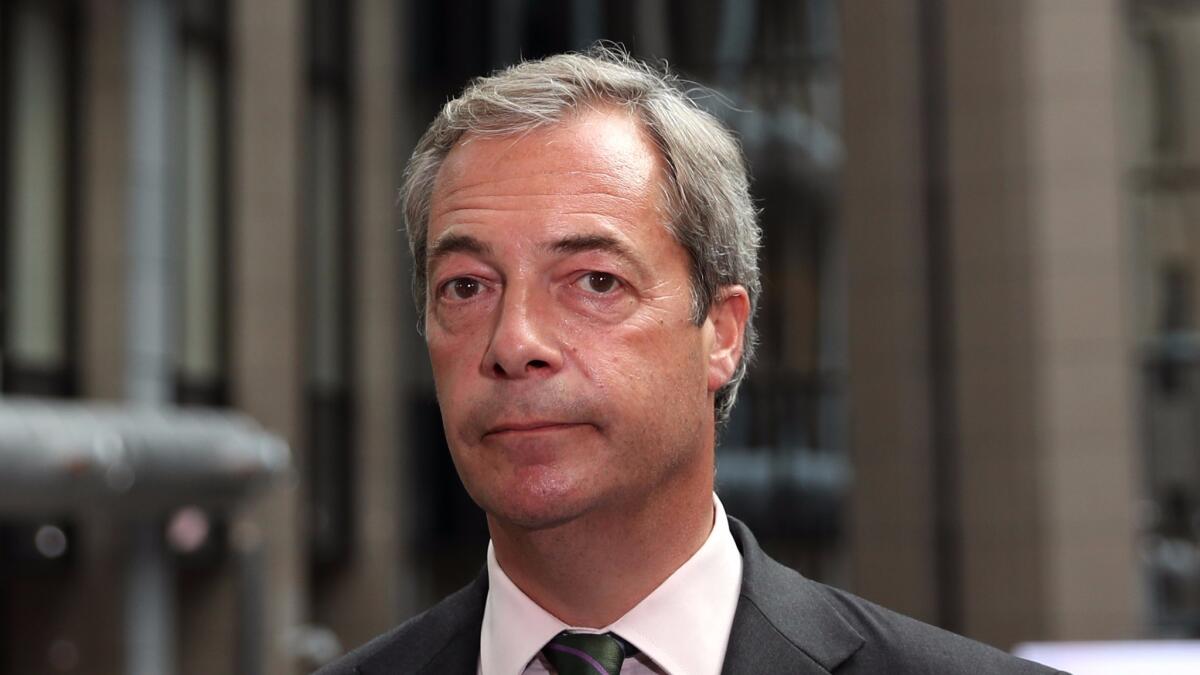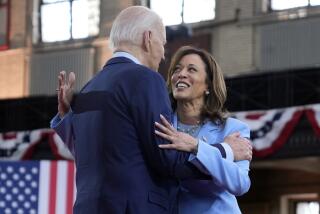Nigel Farage, head of the UK Independence Party, resigns after ‘Brexit’ victory

Reporting from London — Nigel Farage, the brash, outspoken leader of Britain’s UK Independence Party resigned on Monday, saying his “political ambition had been achieved” after 52% of the country voted to leave the European Union on June 23.
Now, less than two weeks after British voters were asked to make the decision of a generation, the two most high profile members of the “Leave” campaign have headed for the exit, leaving behind political and economic turmoil and no clear plan for a way forward.
The first to go was former London Mayor Boris Johnson, who broke ranks with Prime Minister David Cameron by ferociously campaigning for “Brexit,” a move many believe won it for the Leave camp. He made the surprise announcement last week that he would not be putting his name forward for the Conservative Party leadership after his main ally on the campaign trail, Michael Gove, withdrew his support and threw his own name into the ring instead.
Then Farage, who has led his party for the last eight years, announced that he was also bowing out.
“I came into this struggle from business because I wanted us to be a self-governing nation, not to become a career politician,” Farage said. “During the referendum campaign I said, ‘I want my country back.’ What I’m saying today is I want my life back.”
The “Remain” side long warned that those calling to leave the EU had no clear plan for what a post-Brexit Britain would look like.They also issued dire warnings about the economic implications of exiting the 28-member bloc that was created in the wake of World War II, some of which have played out already.
The value of the pound has plummeted against the dollar, stock markets have experienced deep losses and house prices are expected to fall. Chancellor of the Exchequer George Osborne announced that he will cut corporate tax to below 15% - the lowest rate of any major economy - to encourage businesses to continue to invest in Britain. The Labor Party leadership was also sent into a tailspin with a vote of no confidence in its leader, Jeremy Corbyn.
The perception seemed to be taking hold Monday that the biggest proponents of the Leave side are now leaving the electorate high and dry. “Brexodus,” declared the front page of Tuesday morning’s free Metro newspaper for commuters. “Now Farage joins Boris in quitting…. Is this what they meant by Project Leave?”
Charles Perry, who worked on the Remain campaign and helped organize Saturday’s anti-Brexit rally, which saw tens of thousands of people take to the streets of London, described Johnson and Farage as “rats.”
“They’re a merry band of brothers who led us in a merry dance off the cliff. I’ve never seen this sort of political suicide in Britain’s entire history,” Perry said. “It’s shameful and despicable.”
Despite bowing out as UKIP leader, Farage said he will continue to watch the negotiations “like a hawk” from his position as a member of the European Parliament, and weigh in where necessary. Johnson has also dismissed as “rubbish” suggestions that he did not have the guts to go the distance and deal with the aftermath and implementation of Brexit. “I think everybody needs to take advantage of what I think will be a glorious opportunity for Britain,” he told reporters.
A leadership contest is underway within the Conservative Party, and Theresa May, the former home secretary, is considered the favorite to succeed Cameron, and thereby become prime minister.
She campaigned with Cameron to remain in the EU -- somewhat reluctantly, some argue -- and her first priority will be trying to unite her deeply divided party, and then the nation.
The lack of a decisive plan for Britain’s exit from the EU, and the possibility of having a “Remainer” running the country, have raised questions about what political motivation there will be for the next government to follow through at all on the referendum results, which were not politically binding.
A post-referendum poll by Ipsos MORI for the BBC found that more than a third of voters are not convinced Britain will actually leave the EU. It also found that 5% of Leave voters said they would change their vote compared with 2% of Remain voters -- a swing in results that suggests voter remorse, or “Bremorse” – would be significant enough to sway the vote in the other direction.
Former Liberal Democrat leader Nick Clegg, who was deputy prime minister under Cameron’s coalition government, said a general election must be called before Article 50 is evoked - the clause that would set in motion Britain’s withdrawal from the EU block.
“Starting that clock ticking before people have had an opportunity to cast a judgment on what life would actually look like outside the EU would be deeply undemocratic,” he wrote in a column in the Guardian newspaper.
There could also be legal challenges to initiating the process. Solicitors at Mishcon de Reya, acting on behalf of an anonymous group of clients, say they have contact with government lawyers in a bid to ensure Article 50 is not triggered without a full debate and an act of Parliament.
Delaying the process risks creating even more economic instability, and the will of 17 million people who fiercely want to see Brexit happen and were thrilled by the result.
Full coverage: Britain votes to leave the European Union »
ALSO
In China, the ‘Apple of drones’ is flying away with success
Elie Wiesel ‘died as a hero in Israel,’ but it wasn’t always that way
Aide to China’s former leader gets life in prison for bribes
UPDATES:
5:33 p.m.: This article was updated.
11:07 a.m.: This article was updated with staff copy throughout.
3:34 a.m.: This article was updated with information throughout.
This article was originally published at 2:32 a.m.
More to Read
Sign up for Essential California
The most important California stories and recommendations in your inbox every morning.
You may occasionally receive promotional content from the Los Angeles Times.










